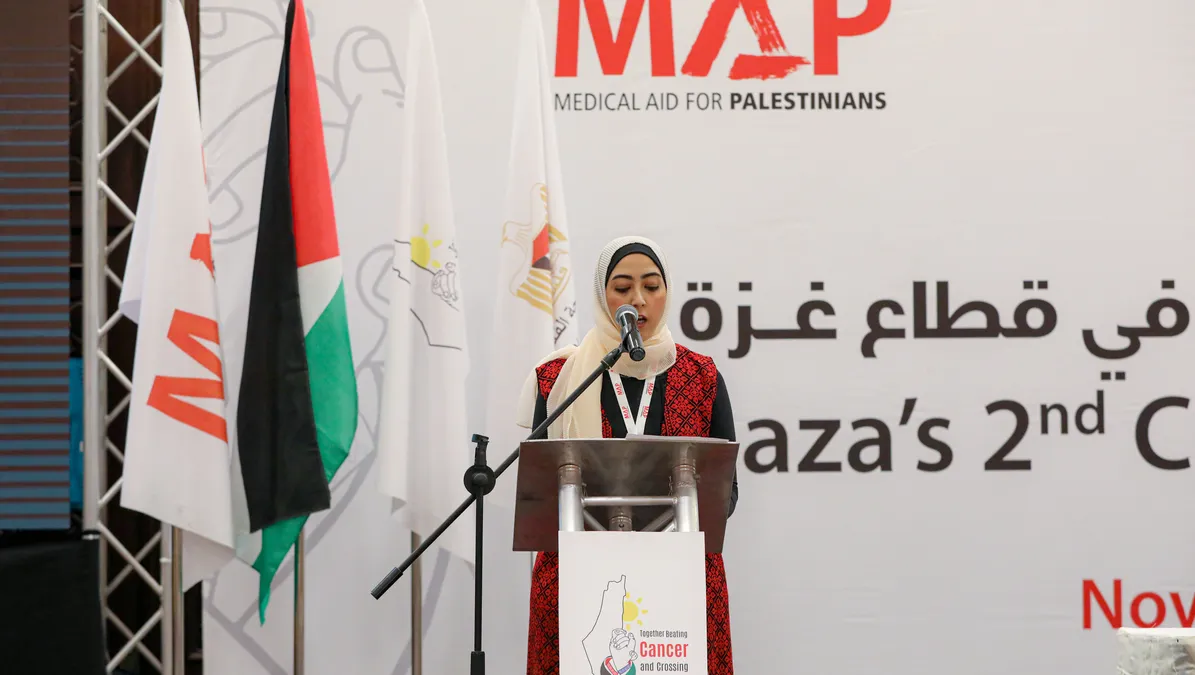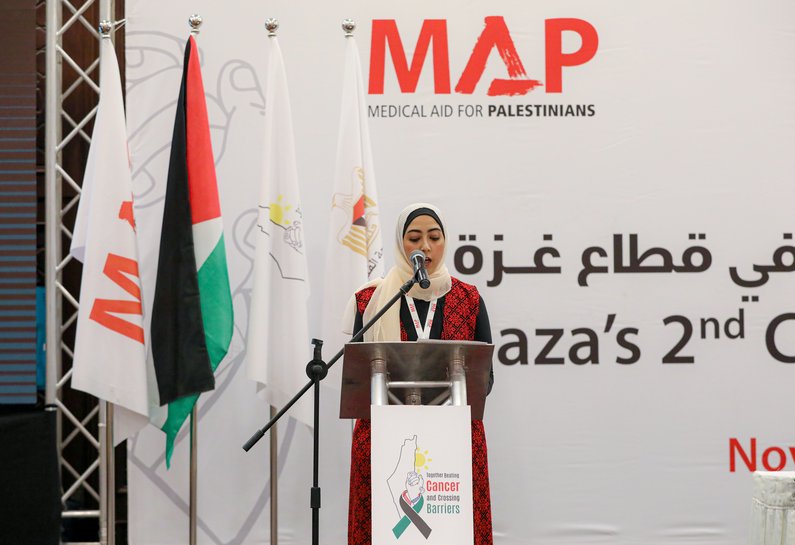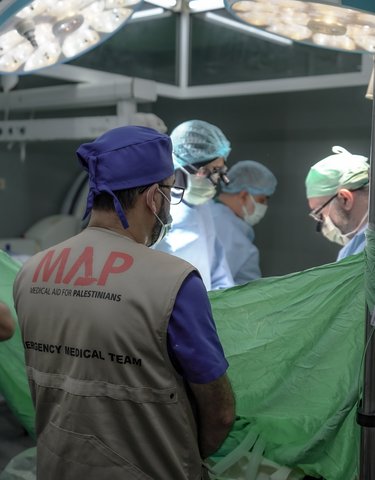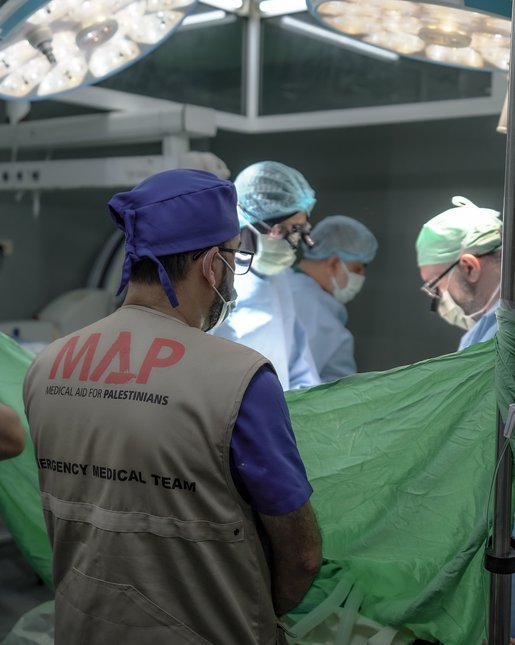MAP hosts Gaza’s second cancer conference on improving care for patients
1 December 2021


We spoke to Rasha Al Moghany, MAP’s Programme Officer in Gaza and one of the conference organisers, about the themes discussed and some of her main takeaways.
What are the most common types of cancer affecting Gaza’s population?
Breast cancer is the most common type of cancer, followed by colorectal cancer, leukaemia, lung cancer and thyroid cancer. They represent more than 50% of cancers.
Breast cancer is also the most common cancer among women, representing 33% of cancers affecting women, while colorectal cancer is the most common among men, representing 14% of cancers affecting men. Overall, cancer is the second leading cause of death in Gaza and lung cancer is ranked top of the five leading causes of cancer mortality.
What challenges do cancer patients face in accessing diagnosis and treatment?
Late detection of cancers is common in Gaza, which decreases the chances of survival. A weakened health system and shortages of drugs, consumables and equipment impact every step in a cancer patients’ journey to survival – from detection and diagnosis, to treatment and follow up.
At the detection stage, there is no organised national screening programme for any type of cancer. After the cancer is detected, the shortages of specialised items like consumables, laboratory reagents and diagnostic equipment causes delays in the completion of diagnosis.
Once patients reach the stage of treatment, they face more shortages of medications, particularly those needed for chemotherapy, as at any given time approximately 45% to 50% of oncology drugs are at “zero-stock” – meaning there is less than one month's supply left, or they have already run out completely. Surgeons also lack the specialised training to perform certain advanced surgeries, and the blockade and closure of Gaza means they are often unable to leave to access training abroad. There is no radiotherapy machine in Gaza, and palliative care services are in the early stages of development.
Many cancer patients get referred to complete their diagnosis and treatment outside Gaza. But patients have to apply for permits, which are often denied or delayed and reduces their chances of survival. This adds another layer of suffering, as patients experience a heavy toll on their psychological wellbeing.
COVID-19 has further complicated the life of cancer patients, as movement restrictions have increased and the referral trip has become more difficult. Patients had to choose between getting their treatment and risking their life to COVID-19 infection at a time when their immunity is already compromised as a result of their illness.
What difficulties do healthcare workers responding to cancer cases face?
Firstly, health workers, like every other Palestinian in Gaza, are economically and psychologically affected by the impact of the blockade, the volatile political situation and the chronic emergency.
Secondly, the shortages of medications and lack of equipment do not only affect the patients but also health workers, as they feel helpless in supporting their patients access the treatment they need.
Thirdly, overcrowding and shortages of staff are major challenges. They might see over 4,000 patients each month at the outpatient departments, which reduces the time available to see each patient, and leads many health professionals feeling unsatisfied about the quality of care they are able to deliver.
Can you explain what the breast cancer multidisciplinary team (MDT) is and how they have had an impact on breast cancer care in Gaza?
A breast cancer MDT includes a group of health professionals from multiple disciplinaries contributing to the diagnosis, treatment and overall management of cancer patients. In 2018, MAP established a breast cancer MDT, in cooperation with the MoH, to contribute to the reduction of significant morbidity and five-year mortality associated with breast cancer in Gaza. MAP has provided technical and logistical support to establish the MDT meetings at the two breast cancer units at the Shifa and Nasser hospitals, which are made up of consultants from the UK and the MoH.
Since December 2018, the MDT has met weekly to discuss breast cancer cases, and the diagnosis and treatment options for patients. Three years on, an evaluation conducted by MAP has found that the MDT was of great value for breast cancer services in the two hospitals, with improvements in diagnosis and treatment.
What do you think is needed to help advance cancer care in Gaza?
It is essential to reduce the rate of referral of patients outside Gaza, so as to eliminate the suffering that cancer patients experience in their journey to access care and to reduce the financial costs associated with referral.
From the conference, we concluded that improvements in cancer services and equipment – including obtaining a radiotherapy machine and PET scanner in Gaza – are vital. Moreover, support to sustainably access oncology drugs and specialised consumables is crucial to enhance the continuity of care delivered to cancer patients. We also need to ensure health professionals can access specialised training outside of Gaza and keep the online links between MAP cancer specialist volunteers and teams in Gaza, especially through the MDT meetings. Finally, we need to encourage early diagnosis of cancer through community awareness campaigns.
Thank you Rasha for your work, and congratulations on a successful conference!
You can support our vital work in Gaza by making a donation today.

